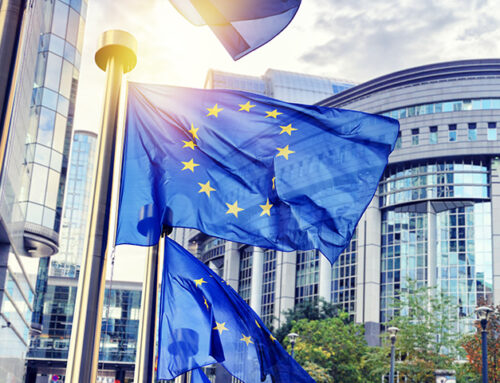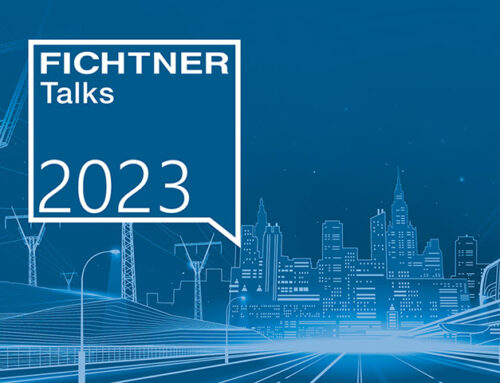Infrastructure in Our Changing Times
Are We Innovative?
Ask Google “What is an innovative company?” and one answer will be: “Innovation is the only way to generate a sustainable competitive advantage and market success. Innovation secures tomorrow’s revenue, lowers costs, and differentiates companies from the market.” Thank you, dear AI. And so the next question goes to us: Is Fichtner an innovative company?
Perhaps we’ll answer with a counter-question: Would Fichtner still exist 101 years after its foundation if we were not innovative in addition to being quality-conscious? We are neither a start-up nor a tech company, but the innovative spirit within the company loves and lives progress. That’s how I see it, but is it really the case? I looked around and inquired. Here are my findings.
Was Mark Twain Right?
He once said: “A person with a new idea is a crank until the idea succeeds.” Let’s hope for the best, because without innovation, or “cranks”, we are unlikely to achieve the important and urgent goals of our time, such as climate neutrality, sustainable energy solutions and so on. Which puts us right in the middle of key infrastructure issues, i.e. our know-how and business. Sure, it’s easy to claim you’re innovative. But it’s best to have evidence. Let’s start with just that. After all, talk is silver, action is golden.
Leading the Way
As a consulting and engineering company, we are tasked with solving problems, not developing innovations. But we do it anyway, and we drive innovation in a whole variety of ways. This is because innovative solutions to problems – technological, economic, organizational, structural, (inter)disciplinary or otherwise – are, of course, crucial to our success.
Looking Ahead
I’m Jochen Lambauer, Head of VLab at Fichtner and Chairman of the Advisory Board of the VDI Society for Energy and Environment (VDI GEU), and I’m sure that only with knowledge, experience and a forward-looking approach can we innovatively shape the future. Fichtner uses several platforms to sharpen its forward-looking perspective and take colleagues and all project employees along with it on this journey. I will present these to you below.
Our Three Platforms for Innovation
1. VisionLab: Exchange and Development Platform for New Consulting Topics
What sets the VLab apart and what makes it innovative?
- It provides a means for Fichtner’s teams to exchange ideas both with each other and with partners and research institutes.
- It is our “observation platform for long-term developments”, and we use it to gather product and solution ideas and provide structured oversight of them through to market maturity.
- It fosters real results that are incorporated into the consulting services of the Fichtner Group.
- It initiates and supervises research projects and develops proposals for strategic initiatives and partnerships.
Being innovative means jointly taking the initiative in the VLab and developing, discussing and coordinating ideas. We have high aspirations to create new consulting approaches in the VLab to be able to master the challenges ahead.
2. FICHTNER Talks: Expert Dialog on the Energy Transition.
What sets the VLab apart and what makes it innovative? This is our second innovation platform. FICHTNER Talks is an event launched in 2016 and moderated by Dr. Albrecht Reuter. It focuses on the present and future issues of climate protection, sustainability and energy transition. What makes it special is that it involves politics, business, science and society from the very beginning. “Innovation only makes sense if it is implemented and lived – by decision-makers, stakeholders and society,” says Dr. Albrecht Reuter. The energy transition requires cooperation and collaboration because “we can only achieve climate neutrality if we win people over to the idea, if we convince them to become active and part of the movement themselves.”
“Innovation does not mean reinventing everything. The many and varied individual building blocks of the energy transition, most of which already exist, must be intelligently and quickly assembled, and viable business models must be developed based on them.”
Dr. Albrecht Reuter
FICHTNER Talks 2022
Last year’s innovation event entitled “Climate Neutrality Through Infrastructure Transformation” took place on 27 September 2022 and was once again the major interdisciplinary platform for discussions and collaborations. It offered short, stimulating presentations and specialist presentations, interesting panel sessions and, of course, the special opportunity to engage in intensive discussion with a wide range of experts and disciplines, whether during the breaks or at the joint dinner.
Innovation Through Cooperation: the C/sells Project
C/sells is a project in which around 60 partners worked on a smart, decentralized energy system and 42 individual projects were implemented in the states of Baden-Württemberg, Bavaria and Hesse. Politicians, funders, technology and energy companies, research institutes and, last but not least, citizens were involved in the local projects in a spirit of partnership. C/sells was embedded in the research and demonstration program SINTEG (Smart Energy Showcases – Digital Agenda for the Energy Transition) and funded by the former German Federal Ministry for Economic Affairs and Energy.

Fichtner’s innovation management developed the idea for the decentralized, cellular and participatory energy concept on which the project is based. Our goal was to demonstrate the importance of flexibility and digital solutions in the energy market and to explore ideas in “living labs” that can be scaled up later. “We launched C/sells, and with the state of Baden-Württemberg we found a sponsor to back us up,” recalls Dr. Reuter, who headed the project. The result of this multi-year endeavor consists of blueprints for energy networks that can accelerate the energy transition through their cellularity, participation and diversity.
3. FICHTNER Summer School: Exchanging Ideas to Broaden Horizons
The C/sells project described above was instrumental in the creation of the third innovation platform at Fichtner, namely the Fichtner Summer School that evolved from it. The idea is to give Fichtner employees and also prospective Fichtner employees the opportunity to “think outside the box” over the course of a week and work on innovation topics, cooperate worldwide and exchange ideas on a project-related basis with colleagues from other disciplines.
The interdisciplinary collaboration, like we have in design and project support, shows how important it is to have this exchange of ideas across disciplines. We often see this in our day-to-day work, for example in large-scale projects and pilot plants for energy and water supply.
My Conclusion
Innovation, change, testing in practice, and renewal – these are the laws of nature and also of our nature. In some areas, it is faster and more pronounced, while in others it still has potential for innovation. But I experience it every day: “We are innovative”, and Fichtner promotes innovation to the best of its ability. 100 years of Fichtner, and its tasks are not becoming less. On the contrary, the world needs our forward-thinking approach more urgently than ever.
June 2023

Dr. Jochen Lambauer
Head of VLab





